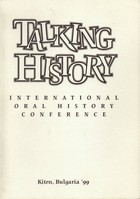
KONOPÁSEK, Z. / KUSÁ, Z. (2000): Political screenings as trials of strength: Methodological consequences of the relativist perspective in oral history research. In: D. Koleva, ed.: Talking history. Sofia: LIK. Str. 63-81
::::
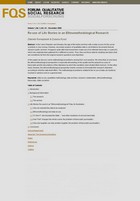
KONOPÁSEK, Z. / KUSÁ, Z. (2000): Re-use of life stories in an ethnomethodological research. Forum Qualitative Sozialforschung / Forum: Qualitative Social Research, 1 (3): 42 odst, čl. 24. Dostupné na adrese http://nbn-resolving.de/urn:nbn:de:0114-fqs0003248
::::In the Czech Republic and Slovakia, the age of life history archives with a wider access for the social scientists is only coming. However, secondary analysis of qualitative data is not limited to documents that are stored in public archives. It happens quite often that researchers make use of an interview transcript, or a part of it, which has originally been gathered for a different occasion. Thus, they use these data for studying new topics that are sometimes far from the original research questions and objectives. In this paper we discuss some methodological problems arising from such practice. We show that, on one hand, the ethnomethodological perspective is especially demanding on the quality and the pinpoint accuracy of transcripts and the descriptions of the interviews by which the narratives were elicited (field memos). On the other hand, however, the ethnomethodological perspective orients scholars to formulate their research objectives according to what the data itself offers. The methodological problems related to the re-use of data can hardly be resolved in advance and on a general level.
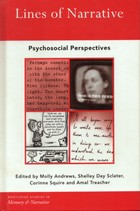
KONOPÁSEK, Z. / ANDREWS, M. (2000): A cautious ethnography of socialism: Autobiographical narrative in the Czech Republic. In: M. Andrews, S. D. Sclater, C. Squire & A. Treacher, eds.: Lines of narrative: Psychosocial perspectives. London & New York: Routledge. Str. 92-103 ::::
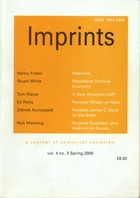
KONOPÁSEK, Z. (2000): When science and the state are less powerful than one might expect. Imprints, 4 (3): 260-269
::::Recenze knihy: SCOTT, J. C. (1998): Seeing like a state: How certain schemes to improve the human condition have failed. New Haven & London: Yale University Press
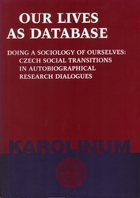
KONOPÁSEK, Z. (2000): Reflexive autobiographies: Interpreting the East - understanding the West. In: Z. Konopásek, ed.: Our lives as database: Doing a sociology of ourselves - Czech social transitions in autobiographical research dialogues. Praha: Karolinum. Str. 281-298
::::

KONOPÁSEK, Z., ed. (2000): Our lives as database: Doing a sociology of ourselves - Czech social transitions in autobiographical research dialogues. Praha: Karolinum. 302 s.
::::
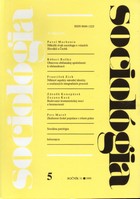
KONOPÁSEK, Z. / KUSÁ, Z. (1999): Budovanie komunistickej moci a bezmocnosti. Sociológia, 31 (5): 459-480
::::This paper turns attention to the period of state socialism. Its aim is to suggest and illustrate a theoretical and analytical framework for making the communists" power problematic from sociological point of view. We would like to promote such a perspective in which the power of communists is not taken - explicitly or implicitly - as something that explains the logic of life under the communist regime; rather, on the contrary, we present it as something that needs to be explained. As such, our approach is inspired by contemporary sociology of science, above all by authors such as Bruno Latour and John Law whose effort is in many respects similar to ours. After a theoretical outline of the approach, we perform its modest practical illustration. We use short extracts from two biographical narratives for an analysis of one particular situation in which the communist power played an important role: the political screenings that followed the military invasion into Czechoslovakia at the end of so called Prague Spring. The screenings are interpreted, in this analytical sketch, as "trials of strength" as well as "real transformations" both of the communist regime itself and all its actors. Above all, we focus on the moments when somebody or something was transformed into a fulcrum, an indisputable and stable entity, or, on the other hand, into a questionable, not-quite-real, because negotiable and reversible network of relations. These moments help us to show the heterogeneous and often surprisingly subtle sources of the political power that constituted state socialism and made it durable.
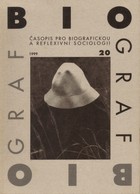
KONOPÁSEK, Z. (1999): Horníci a problém prostředí: ideologie, ekologie, sociologie. Biograf (20): 85-97
(20): 85-97
::::Recenze knihy: MUSIL, L. (1999): Těžba uhlí, problém prostředí, modernita: jak ovlivnila ekologická výzva organizaci jedné ostravské šachty. Brno: Masarykova univerzita & Georgetown University
KONOPÁSEK, Z. (1999): V čem spočívá "pravda" opoziční smlouvy? 2 s. [Nepublikovaný rukopis článku pro noviny]
::::V tomto nikdy nevydaném krátkém textu pro noviny rozebírám tzv. Opoziční smlouvu mezi ODS a ČSSD z let 1998-2002 (viz http://cs.wikipedia.org/wiki/Opoziční_smlouva). V duchu teorie-sítí aktérů rozbíjím představu této smlouvy jako nějakého hotového textu, který určil politickou atmosféru v zemi. Upozorňuji také na falešnou představu, že problém je v tom, že toho o dělané politice víme příliš málo; je to myslím naopak. Tváří v tvář mediální vševědoucnosti (na jejímž vytváření se politici sami podílejí) je podle mne nesmírně obtížné nejen uspět, ale i selhat. Udělali jsme si o Opoziční smlouvě určitý obraz a tím poměřujeme vše, co se jí týká. Nebereme pak opravdu vážně, co jednotliví aktéři teď a tady říkají nebo dělají. "Pravdu" opoziční smlouvy spatřujeme v papíru, co kdysi podepsalo několik straníků, a nikoli v myriádách provizorních a lokálních realizací (přepisů, překladů) toho textu.
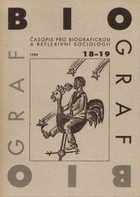
KONOPÁSEK, Z. (1999): Od Černé knihy k černé skříňce: komunismus relativizujícíma očima. Biograf (18-19): 3-24
(18-19): 3-24
::::This paper proposes a sociology of state socialism. It does so by discussing the place of state socialism within the debates on modernity and postmodernity and reassessing the possibilities of so-called biographical research in the field of post-communist studies. The paper also outlines a theoretical and analytical framework for making the communists[a] power problematic from a sociological point of view. Such a perspective suggests that the power of the communists is not taken - explicitly or implicitly - as something that naturally explains the logic of life under the communist regime; on the contrary, it is presented as something that needs to be explained. As such, this approach is inspired by contemporary sociology of science, particularly by the work of Bruno Latour. In doing so, the paper hopes to achieve one important side-effect, namely to (re)establish the phenomena of state socialism as a topic worthy of general sociological attention.

 ? - recenze vyjde v časopise Biograf
? - recenze vyjde v časopise Biograf
 se objevily informace o tom, co lze snad prý během března čekat v nové, sedmé verzi mého oblíbeného analytického programu
se objevily informace o tom, co lze snad prý během března čekat v nové, sedmé verzi mého oblíbeného analytického programu







